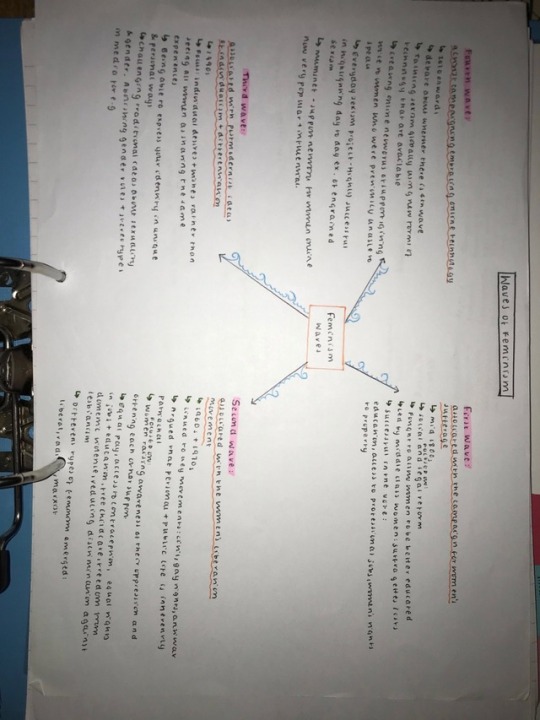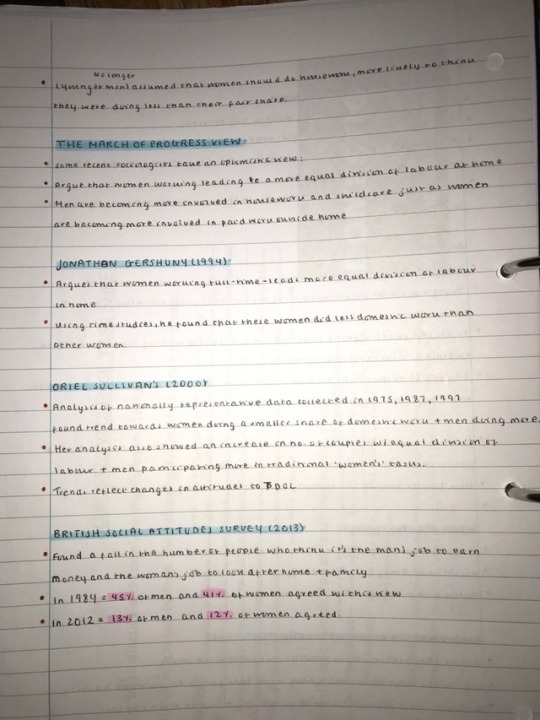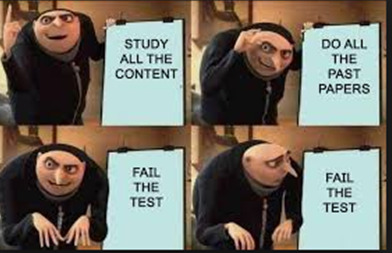Text
Summer.
OK so;school ends in 5 weeks (for us anyway) and summer is here. Now we all know what most people are going to do in the 6-12 weeks you have.Sleep,eat and do nothing. Well, although you sHoULD rEsT for a couple of weeks it is important to rEfReShYoUrMemOrY and not leave anything to the absolutely last minute.

if you wanna be productive person and all, you can make a planner and allocate activities or free time before you start working. I suggest, for your own sanity to not work for more than 4 - 5 hours a day. ok byeeeeee
10 notes
·
View notes
Text
Instead of revising with Flashcards;
Write an explanation in your own words
Create a quiz
Take a practice test written by someone else
Work lots of practice problems (your go-to strategy for math)
Make mind maps or Venn diagrams
5 notes
·
View notes
Text
How to make/use revision cards effectively;
1) Include diagrams as well as words. Go check out the Picture Superiority Effect which shows that people remember imagery better than words, and pictures alongside descriptive text works best.
2) Write one question per card. If your write multiple facts on a card then you mistake recognition for recall. Basically you recognise the fact but don’t necessarily remember it. But if you’re faced with one question and one answer then you’re brain can’t divert from the truth- either you remembered it this time or didn’t.
3) Break complex concepts into multiple questions. Pretty self explanatory and for the same reason as above, you don’t want gaps in your memory because you’re able to recollect parts of a concept and therefore think you know it all.
4) Practice using words in context. If you need to remember the definition of a word, ask yourself the definition and then ask yourself another question, define this word in the context of...
5) Say your answers out loud while asking self questions. You just remember stuff way better if you have to announce it- and if someone tests you they can make sure you don’t half-heartedly revise an answer.
6) Make your own rather than stealing someone elses or using a programme- you can personalise them and even the act of writing them out will help your recollection.
7) Learn in both directions. Switch between answer, question, question, answer. This strengthens your understanding and ability to remember a fact.
8 notes
·
View notes
Text
Why your lower sixth mock exams matter ....
I’m sure you’ve heard it all before from your teachers but as the dark cloud of stress and worry looms over us, it is apparent there is something to address - exam season. It’s right around the corner, and for those in the year above, it will be coming to an end shortly.
So why do they matter? Should we be reduced to mere numbers on a page? Should we be subjected to spend hours of our finite existence sitting in a hall writing on paper from Brazil in the era of climate change? To what extent do our mocks truly matter?
In an educational sense, sure, mocks give a reflection of how far you have come in a year, the gaps in your knowledge and quantitative data for predicted grades.
However, here on the IB blog we work tirelessly to bring a new angle, to develop our readers into the global-thinkers the IB wants you to be.
So on a larger scale, do mocks matter? No, of course not. This is not to discourage you from working hard and revising for them, we implore everyone to aim to reach their fullest potential on their mock examinations. But, unfortunately we have become acclimatised to a culture of tests and being defined by one day of your academic career. This can often lead to exams becoming a scary and unwelcoming idea to many people, rather than a positive experience by which you can learn about your strengths and weaknesses to promote self-growth and success in the future. Furthermore, this can only be achieved by a re-structuring of our education system, and those who lead it. (If you would like my view on alternate examination methods and structures, like my post and I will produce that article).
To conclude, I encourage you all to revise for mocks, tell us how it went and message us with any queries or concerns. But overall, they do not define you.
1 note
·
View note
Text
How to not un-alive in the exams
- START EARLY

Make sure you know what all your exams entail, what´s on them, what you need to know and go through, that way you understand exactly what is required, and you study the right amount.
Studying gradually over a few weeks before you really sit down and start exam revision will help you remember better, as revisiting the same topics over and over will hopefully reinforce the knowledge you need.
-DON´T PROCRASTINATE

I can´t force you to do your work, but procrastinating is by far the best way to waste important time, that could be spent getting you a good grade. Aim to do as well as you can on the exams, get rid of all distractions; console(´s), games, phone (at least while revising), generally anything unproductive. Just dedicate one or two weeks before the exams, as well as time during the exams, to being productive. You wan´t a high grade right? so put down your phone, and GET WORKING.
-DON´T STRESS

Yes, i may have implied a bit that you should worry and panic and only think about the exams, but you need time to relax too, nobody can keep up a month of constant hard work efficiently. Set periods to relax, they could be ten or twenty minutes of whatever you wan´t every 40 minutes of work, or something like it. And maybe dedicate a whole day to not doing anything, not during the exams of course, but just to relax and steam off a bit. It´s not procrastinating if you planned on doing it, and know you can still do well despite doing it.
-GET SOME SLEEP


Sleep is ESSENTIAL, if you don´t sleep enough you´ll either, not remember what you´re revising, or not do well in the exam in general. You can´t think straight when your tired. Period. 8 hours of sleep or more is all you need, that´s plenty, go to bed at 10, you can still wake up at 6 fresh and fine. or 11:7, or 12:8.
Don´t sleep too much either. If you only need 8 hours, why waste time sleeping from 12 to 12, that´s four hours you flushed down the drain, 8 hours is enough, whether or not that seems like a lot or a little to you does not change that.
Yours sincerely -xxx(thesaucyboy)xxx-
7 notes
·
View notes
Text
Creating a revision Timetable
Now lets be honest. I know you probably haven’t created a good or any revision timetable for that matter; don’t worry most of us in school haven’t. From experience; creating an effective revision timetable can be a life and grade saver. I’m gonna share my tips with you as best as i can but don’t count on me lol.
First of all; you should probably have an exam timetable; if you don’t, ask your school and come back later. Secondly; plan ahead the dates and times of activities you have to go to such as cadets, school, shopping and such. once you have those on a sheet of paper; you can get started.
Create one A5 sheet per week leading up to your exam; create 7 days and an hourly schedule on the y - axis of the table. Next; insert all of the pre - planned activities into the hourly slots.
One piece of advice i have, which i got from a student who studies a masters in medical. Dedicate work into slots between 8 am and 6 pm; no earlier and no later, the rest is for relaxation time.
Finally; insert the subjects in the timetable so you do two subjects a day so you can intensely focus on them while still rotating.
Good luck with your exams!!!! or the rest of them lol
10 notes
·
View notes
Text
Back to school tip; How to only take relevant notes in class;
Want to make a change now that you’re back from break?;
Before writing something down ask yourself a few questions. In practice it might seem like you’re too focused on not missing anything to pick and choose what’s relevant. But if you begin by implementing this while taking notes at home rather than under timed conditions than it might become something you do automatically in classes. Making your notes altogether more relevant and useful.
1) Have I already written this down in another form before and am I just writing it out again because of anxiety to miss something? Is this new to me? - If yes, don’t bother, it’ll save you time and energy and make your notes more revision practical.
2) How relevant is this? you might tell yourself that you don’t know what you need to know until you know- which is when you open your exam paper, and therefore everything must be learnt. But honestly you can hazard a guess- four pages of context in a history textbook- or a quirky tale that you’re likely to remember without writing down don’t need to be written out word for word.
3) Do I need to copy this sentence out exactly as it is written just because I like the way it’s formulated? Nope, not really, not at all, if it’s concise and there’s no better formulation then naturally do so because it’s more of a waste of your time to form “creative notes”. But otherwise try to avoid writing a sentence- such as an introductory sentence in a textbook out just because you want your notes to read nicely. -but I do tend to write things out that teachers say which seem to particularly stand out as useful, the nice thing is that the majority of teachers tend to repeat themselves
4) Can I write this out in my own words, or in a way that will help me remember and establish understanding?- THE NUMBER ONE TIP- is to read a paragraph or two through before making any notes, I tend to read a sentence and take it down in note form, i.e dropping the determiners (no.1 tip- read para before taking notes) straight away. But you may come across a much more concise, better formulated way of expressing this piece of information later on
5) What am I making these notes for, a essay, a test, or a project? How you use your notes should affect their format and content, making them more useful to you later on.
Also some people find it useful to read through their notes and summarise them later in the day or a while later as revision and to make a mass of pages more comprehensible.
Sorry you’re back but make the most of it, if it’s any consolation, the 6th of may is a bank holiday Monday.
8 notes
·
View notes
Text
IB and Sign Language (part 1)
The IB endears the youth of today to be global thinkers, stretch beyond alternative and traditional courses, such as A Levels, with its broad curriculum and passion for a varied personal outcome. To inspire IB participants to have an arsenal containing knowledge spanning over 6 subjects, to encourage community action via CAS, to question the world around you at all times.
With growing attention to the world comes a greater responsibility. The IB is about speaking out against injustices and creating an inclusive space for all. The learner profile of the IB contains descriptors such as balanced, inquirers and open-minded; these all being attributes the IB program hopes to instil within its participants.
This raises the question, why is there no IB sign language course? (BSL, ASL etc.)
In the UK alone, approximately 150,000 people use BSL (British Sign Language) and close to 90,000 of these people are deaf, according to a 2017 census. Worldwide this number reaches 466 million, which is over twice as many French speakers globally. Therefore, it is clear there is an incentive to produce a course and introduce it in as many schools as possible for deaf or hard of hearing students and encourage it among unimpaired hearing students likewise.
The IB recently held a meeting in the summer of 2018 in The Hague discussing a potential for this to occur, however without enough student and school action involved we will not see such an important cultural aspect be explored by the IB.
Stay tuned for more updates on the journey to involving sign language in the IB.
6 notes
·
View notes
Text
Overworking vs keysmash
ok so. Spring break was a flop and unless you are productive well... your spring break can probably be presented through keysmash. fusewilafg
So i just have a simple message as i am rather brain-dead right now. Do not overwork yourself to the extent where you cannot do anything remotely fun without feeling guilty and unproductive. Take some time to yourself even if this means not doing anything for two days or a week, because remember
quality over quantity

3 notes
·
View notes
Text
Work experience exchange, not worth your time?



This is mainly to help anyone deliberating about participating in work experience/ an exchange make a decision. I recently got back from doing two weeks work experience in Frankfurt. Here’s why it’s worth doing;
It really does do wonders for your fluency- although a lot of people speak English you’ll inevitably have to “think on your feet” while communicating and making mistakes will only lead to improvement, but you can also revert to English so no worries- most people speak some
Exposure to the working world and networking
It’s basically a holiday with friends- after work and on the weekend you get to explore where you’re working. Frankfurt had a great arts scene and you end up going for after work drinks/ coffee and getting an idea of what employment will feel like, finding out what you do and don’t want to do in the future.

If you’re interested in working with books/ the arts for example there’s a university which takes interns all the time and several bookshops in Frankfurt. These are the kind of placements available worldwide. I ended up working one day at the HFG- which is one of the most presitigious art and design unis in Germany, just because the bookshop I worked at supplied the university, people are generally very happy and willing to pass on what they know


Several people I know also got placements at prestigious banks/ law firms (particularly as Frankfurt is the capital of banking following London in Europe)so there’s a lot of placement variety

Accommodation is free- and the nightmares of a weird exchange family are both rare and worth enduring for the FREE aspect, also if you’re vegetarian or have other dietary requirements exchange families are in my experience very willing to accommodate this
You feel really independent and you definitely become more independent- you’re accountable for showing up to work on time and fulfilling your responsibilities at work- I picked up invaluable computer skills and proffession specific skills, there are just some things, such as how to log receipts online or write a formal email that can only be learnt in practice and no one is patronising. By the end you are given as much repsponsibilty as your colleagues, if this sounds daunting, no worries- everyone in Europe (or further abroad) is much more direct than the British and won’t mind being told you want to slow down your integration.

2 notes
·
View notes
Text



In love with my friends sociology revisions notes😍. Hope this inspires some of you guys to start making some notes! Top tips are;
Highlight key ideas/ terms or anything you need to refresh your memory on
Put key terms on a post it note- you can move these around and even stick them on your wall to revise
Mind maps- good for establishing links between ideas
Place any comparable ideas in columns
2 notes
·
View notes
Text
Holiday revision tips and tricks;

We’ll be posting advice throughout the Easter break. To start off we’ve asked people what their plans are to get organised and start revising for mocks over Easter to give some inspo and alleviate that anxiety you feel wondering what the hell everyone else is doing and how you compare;
“I’ve made two lists- one for homework and one for revision. I’m trying to get all the homework out the way first as a priority and then I’m going to start revision e.g. flash cards for each module so that way I’m up to date.”
“Maths- I’m going to make sure that I know what all the formulas in the booklet are for and keep going over practice questions for each topic we’ve done until I get everything correct.
Physics-I use IB physics net, it’s a website containing all the content and is easy to revise from using methods such as flashcards.
English- getting quotes from books, I’m going to make a google document with four columns, one for each book with quotes and analysis and share it around as a revision aid.
History-making notes and writing a couple of essays. I also might make flash cards with significant dates and facts.
Philospophy- make flash cards of all the things I’ve learnt so far
Maths and English coursework- do some editing
EE- I’m going to get started on the EE as it will get stressful later so it’s best to at least start planning in extreme detail what to do
But mainly just relaxing :))”

5 notes
·
View notes
Text
Dealing with personal issues
let’s be real. We all have problems that can block us from doing what we should be. And that is perfectly okay!!!!!!!!!! the thing you have to remember is that school is not everything and it doesn't matter if you fail one dang text. that’s right. your mental health matters more than a dang grade.
Take this as an example. I’m a trans dude and the dysphoria is literally crippling but when this happens; i take a day off to myself and if necessary ask for an extension. Your school i’m sure has an office for safeguarding or simply a member of staff you trust to go to.
I’m sure that they will value your health over a single grade:)

3 notes
·
View notes
Text
How to prepare for a test
Although all subjects and topics are different, most have these things in common.
- Go to bed early, 8 hours is the minimum, so get 9 hours of sleep and wake up feeling ready for the test. Going to bed late to get that extra bit of study in will leave you worse off, as being tired is proven to make it harder to concentrate and remember things; which are two fairly clear requirements to do well on a test. Going to bed late is a good way to fail a test you we’re completely prepared for.

- Go through all the material, it might sound like overkill, but go through everything on that topic, do all the relevant practice questions you can find, and make sure you do it in good time. Don’t study the day before, or on the DAY ITSELF. Try study the weekend before, then the day before and then finally the lesson before if you need to, but make sure you’ve reinforced your knowledge. Not studying might have worked for the geniuses before the I.B but few can handle the I.B without putting in the effort.

-Do something nice, this might sound counteractive but being in a good mood, as well as being prepared for the test and having had a good nights sleeps, will leave you fully prepared for whatever test you may have. Be confident and don’t think about the grade, think about the test, what’s going to be on it, and how you to handle it. The grade is completely irrelevant until you reach the actual exams. Even if you still do bad, simply learn from your mistakes, go through what you did wrong on the test, so you’ll do better on the next test.
- Be confident, ready, well slept and unafraid of the test, hell maybe even be excited you get to show off the knowledge you worked so hard to get. That way you’ll do well on the test, which leads to IB as a whole.
Sincerely - “The Cowardly Lion” -
8 notes
·
View notes
Text
How to recharge properly in frees/ free time
It’s not all that easy to work solidly every study period without hesitation and then do a few more hours once you get home. You might have great self discipline but even then your resolve and energy will naturally decline. We’re all human and we have to accommodate the limitations of being human.
1) Talk to people- phone breaks are good because your brain switches off but they don’t give me the adrenaline boost I need to bother to start work again. Talking to people tends to be much less predictable than scrolling through an Instagram feed- if I’m stimulated in conversation, whether it be a lively debate about cultural appropriation or just mindless banter, allowing me a pause from thought then I tend to return to the study room with the outlook that I’ve had my fun and now need to get things done.
2) Snack- not like gorge yourself on trashy foods that tire you out and weigh you down. More like, grab an apple, or a sugary bar posing as healthy and nibble on it. If you need a quick fix for a lull in energy the sugar will go straight to your blood stream and straight to your brain. I like to just wander over to the lunch hall- buy water, buy a snack, have a chat and then wander back to the study room. Same goes for at home, walk down to the kitchen, drink something, eat an orange and feel replenished.
3) Walk about- lying down is never your best option, you have to get back up-sometimes that’s a bit of a stretch, staring at a wall/ your duvet is more stimulating than the work you have to go back to and remains so for the rest of the study period/ day. So just get up and walk off- sometimes I feel my brain dive into a dark, overwhelming place- one where I’ve done work for the past hour but it feels like I’ve done nothing and I just leave. Sometimes sitting in that same seat or standing in that spot leaves you prey to a pool of thoughts that stimulate one another and pick and pluck at you. Be stimulated by something else outside- people, a place. Use periods where your allowed to leave school grounds and don’t feel that you’re in a place to get anything done for this. Or use your local park. You will walk back a renewed person. Change your perspective-literally and mentally.
Sometimes when you are in the grasp of a certain mindset you don’t feel it’s a place you can step out of. Often you just need to do make the intangible, tangible- do something physical to affect your mentality- stimulate your senses. Talk to someone, eat something, see something.

3 notes
·
View notes
Text
Maths Studies Internal assessment
hey! this year’s batch are the last to do this:) I know my school’s first year IB students have been struggling massively with completing the first deadline; so i thought i’d share some advice on this.
The studies we have to do for out IA are on correlations. I know it may seem like a great hassle, but FIND A TOPIC THAT YOU ENJOY!!!!!!!!!!!!!!!!!!!!!!!!!!!!!!!!!!! i started off doing something generic which was carbon emissions and GDP (idek why) and then moved onto another topic that i actually enjoy.
You have now chosen a topic that you like and have found adequate data. If you are still struggling with finding data, research on gapminder. Once this has been completed; you need to start doing your calculations. use your TI for this and double check the values on excel, screenshotting them for proof.
Next, and i cannot stress this enough, MAKE A PLAN AND STICK TO IT. plan it out paragraph by paragraph and point by point, to ensure that you receive the best possible marks. When doing this, remember that maths studies has no rules on the am mount that teachers can help you; therefore ASK THEM FOR REGULAR FEEDBACK, THEY JUST WANT YOU TO PASS!!!
LASTLY; TAKE A BREAK AND READ IT OVER. your mind will precieve it as good enough when you are working and tired of it. wait a couple of days and re - read it, making any changes where you feel you can and should. do not change it if it is your gut feeling.

- TIN MAN
3 notes
·
View notes